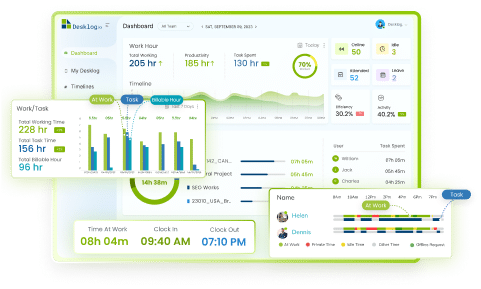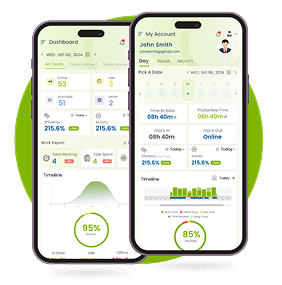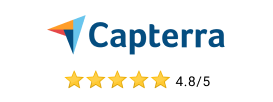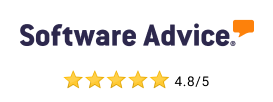Remote work for startups isn’t just an option, it’s becoming a standard. In 2025, over 98% of employees express a desire to work remotely in some capacity, and more than 85% of companies say it has improved overall performance. These aren’t just statistics, they represent a global shift in how modern businesses thrive.
For startups, the benefits are clear: reduced operational costs, wider access to global talent, and a marked increase in employee satisfaction and rate of employee efficiency. But to unlock the full potential of remote work, startups must lean on the right tools, particularly time tracking software, employee productivity software, and efficient remote employee management systems.
In this complete guide, we’ll break down the why and how of building a successful remote-first startup, including tools, challenges, benefits, and insights to maximize performance.
Why Remote Work Is a Smart Move for Startups?
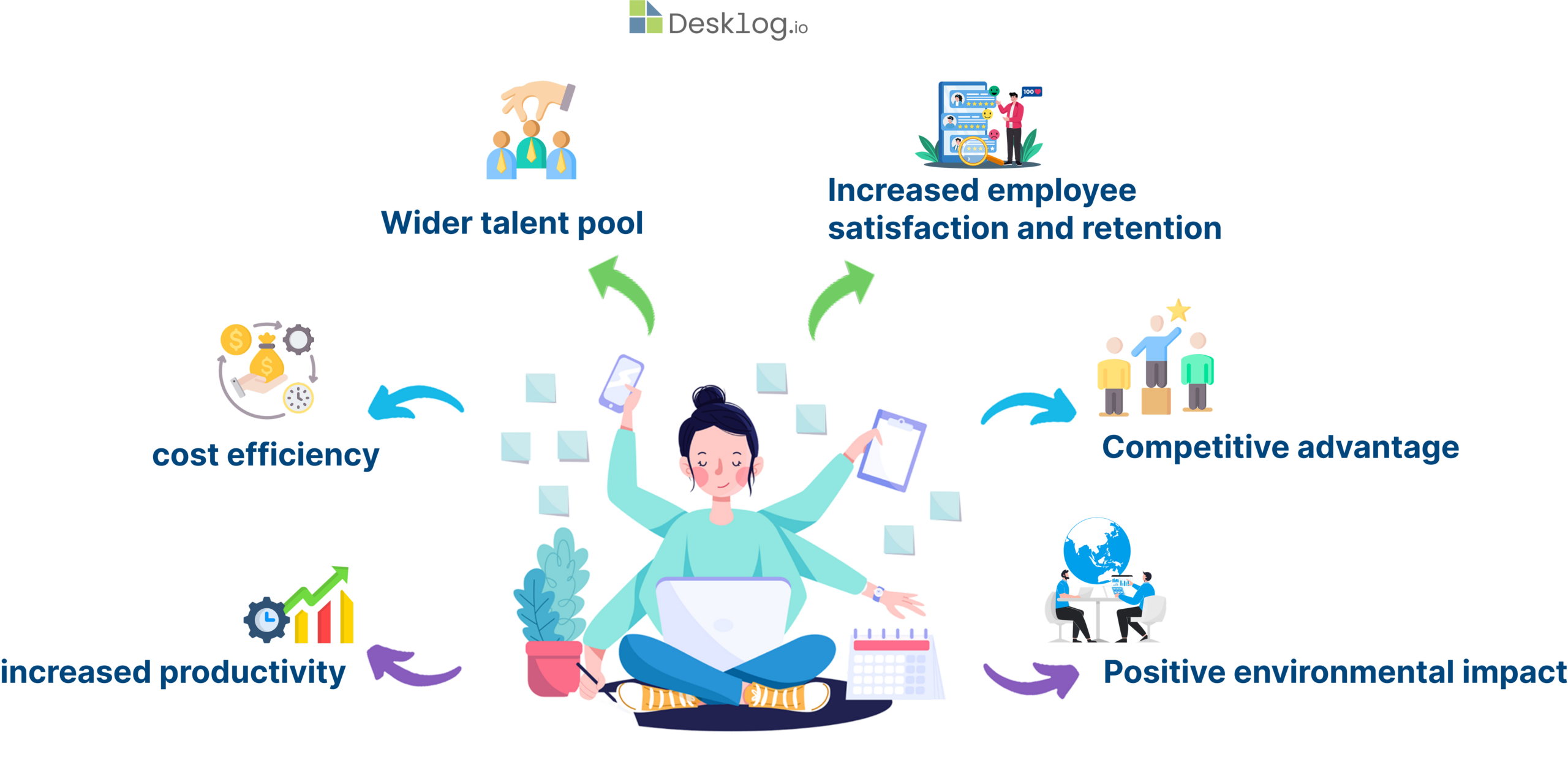
Adopting remote work for startups is more than a cost-saving move, it’s a smart growth strategy. By eliminating the need for physical offices and offering more flexibility, startups can scale quickly without compromising on productivity or talent. According to a Stanford study, remote workers are up to 47% more productive than their in-office counterparts, and businesses can save up to $11,000 per employee annually by adopting a hybrid work model. Looks like a cool deal doesn’t it? Let’s find some benefits of it;
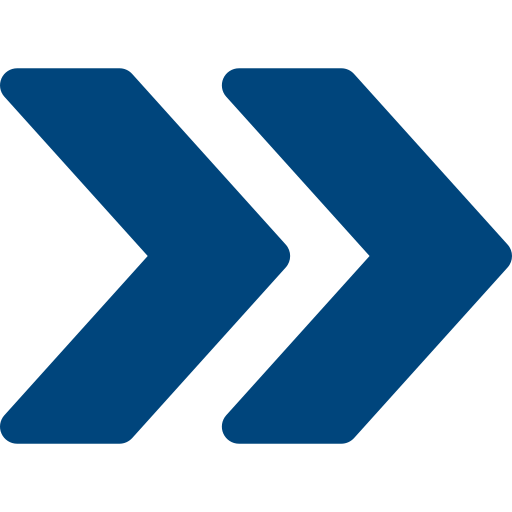
Flexible Work Environment
Remote work removes geographical barriers, giving startups access to a more diverse, global workforce. It also allows employees to work in settings that suit them best, improving overall well-being. The result? increased employee satisfaction and better workload distribution across teams.

Increased Efficiency and Productivity
With fewer workplace distractions and more autonomy, employees can focus better, leading to a higher rate of employee efficiency. Startups also reduce operational costs like rent, utilities, and on-site infrastructure. When paired with tools like time tracking software and employee time tracking apps, founders can measure employee productivity in real time and make smarter staffing decisions.
Startups that embrace remote work unlock major advantages: lean operations, broader recruitment, and improved employee morale, all essential for surviving and thriving in today’s competitive landscape.

Benefits of Remote Work: Employees vs. Employers
The shift to remote work benefits both sides of the employment equation. While employees enjoy increased autonomy, employers see reduced overhead and better team performance. From both an employee and employer perspective, remote work delivers mutual value. For startups, this dual-benefit model leads to stronger retention, better culture, and a sustainable path to scale.
| For Employees | For Employers |
|---|---|
| Freedom and Flexibility | Cost Reduction on Office Space |
| Healthier Work-Life Balance | Access to a Larger Talent Pool |
| Can result in anxiety, worry or occasional irritability. | Involves deeper emotional and physical exhaustion. |
| Increased Satisfaction and Motivation | Increased Loyalty and Retention |
| Higher Productivity | Higher Overall Company Output |

Common Remote Work Challenges
While remote work tracking for startups offers agility and cost-effectiveness, it also introduces several operational and managerial hurdles. Recognizing these challenges is essential for maintaining consistent productivity, accountability, and cohesion in distributed teams.
According to the 2025 stats, notably, over half (52%) of small businesses plan to outsource at least one business process in the foreseeable future, highlighting the growing reliance on external services to increase efficiency and focus on core operations.

Lack of Visibility
One of the most common frustrations for managers in a remote setup is the reduced visibility into day-to-day work. Without the ability to casually check in or observe team dynamics, it becomes difficult to know who’s working on what, or how progress is unfolding. Not knowing who is actively working or what tasks are being handled can hinder remote employee management. This lack of transparency limits access to vital remote employee management insights, making it harder to maximize employee performance. This gap often leads to a lack of accountability and makes it harder to identify who might need support or recognition.
Desklog addresses this challenge by offering automated time tracking and project time tracking features. With automated hour logging, detailed task views, and real-time activity insights, managers gain clear visibility into team performance without the need to micromanage. It becomes easier to track how time is spent, identify productivity dips, and ensure tasks are progressing smoothly.

Communication Breakdown
Remote work strips away the spontaneous interactions that happen in a physical office—no quick chats in the hallway, no overheard updates, no informal check-ins. As a result, critical information can get lost in the shuffle. Feedback may be delayed, and team alignment starts to suffer. These gaps create unnecessary workplace distractions, disrupt collaboration, and erode team morale over time, all of which impact productivity.
To smooth this over, integrated task systems that allow you to assign work, add clear descriptions, and leave comments directly within the task can be a game changer. Desklog helps centralize updates and eliminates the need for endless email threads or scattered messages, making communication more fluid and focused, allowing everyone to stay on the same page without unnecessary back-and-forth.

Time Tracking Issues
One of the most persistent challenges is tracking how employees spend their time. Without precise data, startups often deal with project cost overruns, inefficiencies, and billing disputes. Inconsistent or missing data from tools like employee time tracking apps, or online time tracking softwares makes it difficult to measure employee productivity or evaluate the rate of employee efficiency.
Today’s better-designed tools do more than just log hours, they show when someone clocks in and out, how long they stay focused, and provide visual cues such as productivity breakdowns. Desklog delivers this level of clarity, enabling managers to support their teams rather than scrutinize them, and fostering trust while keeping work on track.

Work-Life Balance Confusion
While remote work aims to improve flexibility, it can blur the lines between work and personal life. Employees may find themselves working outside regular hours, leading to burnout and declining employee satisfaction. This ongoing imbalance impacts engagement and long-term retention.
When the home doubles as the office, it’s easy for employees to lose track of when to log off, leading to burnout over time.
That’s why built-in prompts that flag overwork or remind teams to take breaks can be surprisingly impactful. Coupled with clear tracking of daily work hours, task completion, over/relaxation time notifications as seen in Desklog, they help teams (and individuals) build healthier, more sustainable routines.

Uneven Workload Distribution
Without a centralized view of team capacity, startups may unintentionally overload some employees while others have lighter assignments. Poor workload distribution often leads to disengagement, resentment, and uneven project performance, all of which decrease overall efficiency.
In distributed teams, it’s often hard to see who’s stretched thin and who has room to take on more. Without that visibility, managers might unintentionally overload certain people while others wait for direction, which affects morale and performance.
Smart task management features, such as subtask management and visual workload tracking, make it easier to divide work fairly and adjust on the fly. Desklog offers both, providing detailed insights into individual workloads and task breakdowns. This helps ensure responsibilities are clearly defined, promotes balanced collaboration, and leads to more consistent project delivery.

Attendance Tracking Difficulties
Remote teams working across different time zones pose a unique attendance management challenge. A lack of accurate data leads to an increase in employee absenteeism in the workplace, which in turn affects team performance and delivery timelines. Knowing how to manage remote employee attendance becomes increasingly vital as teams grow.
Instead of relying on manual check-ins, tools that automatically track attendance and leave requests allow HR teams to monitor patterns, flag concerns early, and ensure proper resource allocation. With features like real-time attendance tracking and leave management, Desklog helps growing teams stay agile without becoming chaotic.
Freelancers vs. Remote Employees: What Startups Should Know
Should you hire a freelancer or a full-time remote employee? Each option has pros and cons. This section helps you determine the right fit for your startup’s current needs.
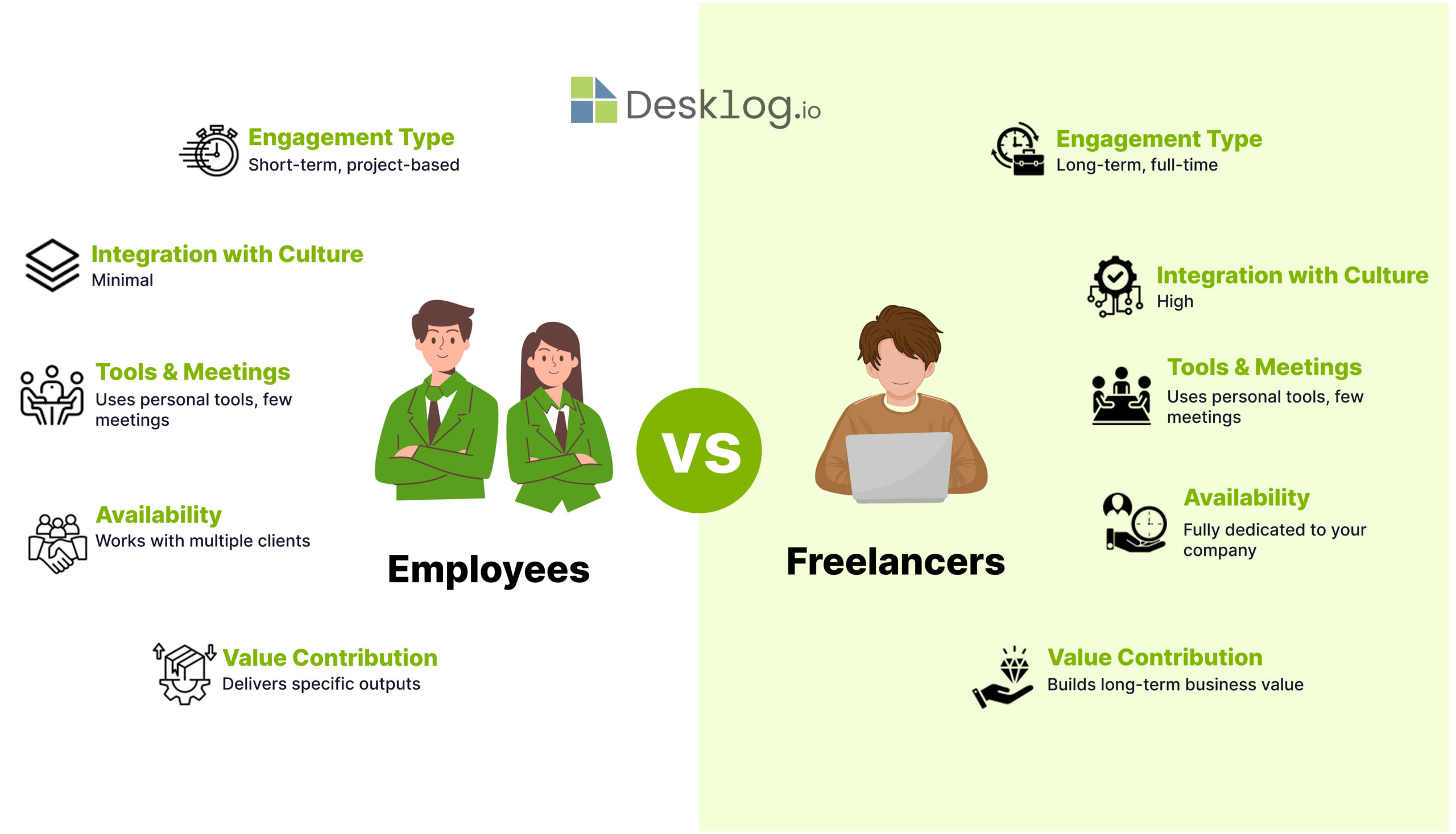
Freelancers offer flexibility; remote employees provide stability. Choose freelancers for one-off needs and remote employees for consistent, long-term growth and employee accountability.
SaaS Tools for Remote Work Tracking for Startups in 2025
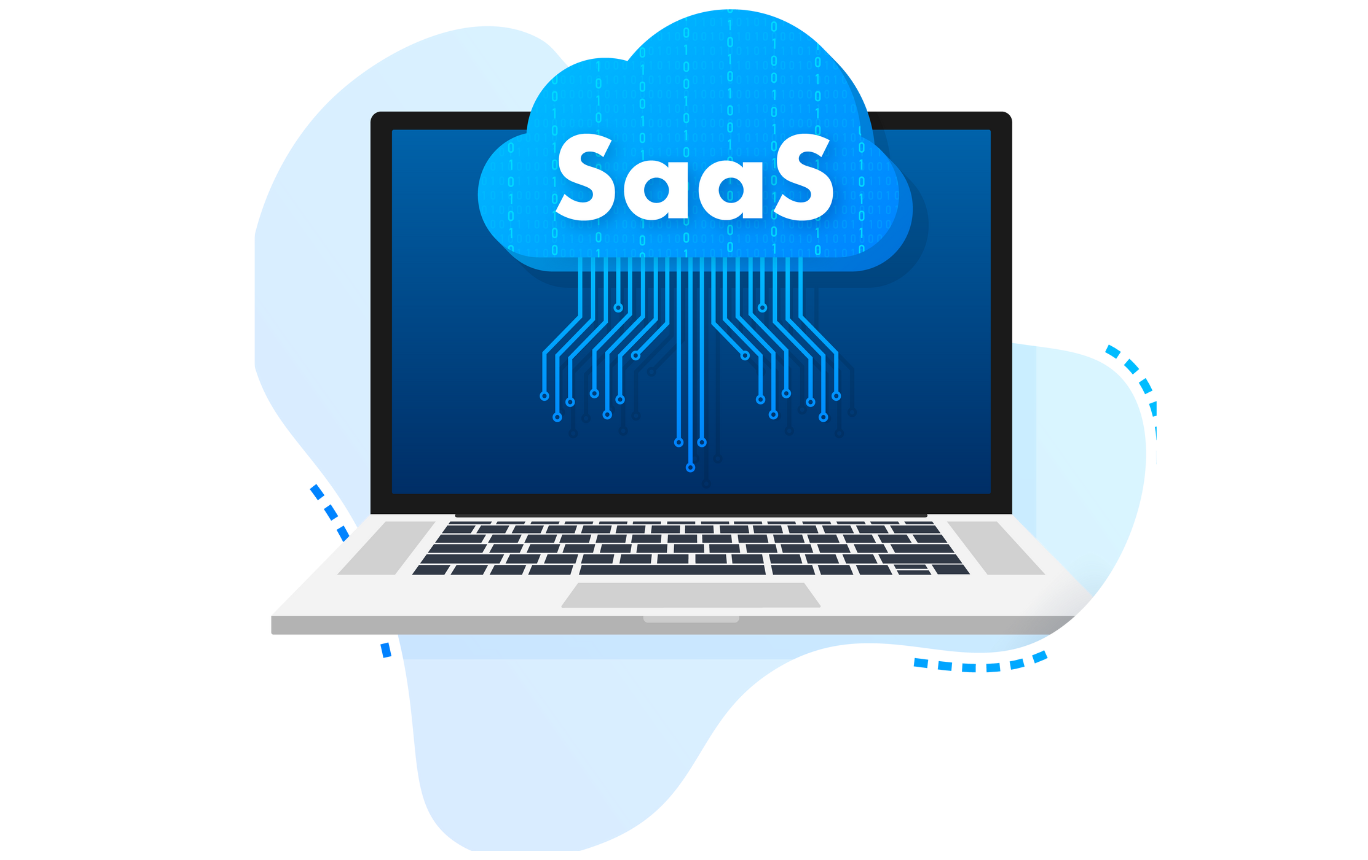
In 2025, startups rely on SaaS tools to simplify remote work tracking for startups, improve employee productivity and maintain smooth operations. The right tools enable effective communication, accurate time tracking, and seamless HR management, essentials for remote team success.
➠ Team Collaboration Tools
Effective communication is the bedrock of successful remote teams. Tools like Slack, Zoom, Microsoft Teams, and Asana allow startups to foster real-time conversations, structured meetings, and organized task delegation. These platforms act as virtual offices, creating a centralized space where ideas, updates, and documents flow freely.
Startups can reduce workplace distractions and increase alignment by encouraging smooth collaboration, especially across departments and time zones. These tools become essential pillars for effectively managing a team with a focus on remote work tracking for startups, ensuring that no update slips through the cracks.
➠ Time & Attendance Management
Tracking how and when your team works is vital for performance and accountability. Solutions like Desklog help startups keep an accurate record of hours worked, project contributions, and active time. These systems act as your digital punch clock, ensuring that each team member’s workday is measurable and transparent.
By implementing time-keeping software, attendance tracker apps, and a reliable employee time tracking app, startups gain critical insights into how to manage remote employee attendance, minimize employee absenteeism in the workplace, and distribute workload fairly across the team. The role of time tracking is central here, it helps measure employee productivity, avoid project cost overruns, and foster employee accountability, all crucial components of remote work tracking for startups.
➠ Payroll & HR Tools
As teams go global, payroll and compliance become increasingly complex. SaaS solutions like Gusto, Deel, and Remote.com simplify international hiring, simplify tax handling, and automate employee benefits administration. These tools eliminate guesswork in HR, allowing startups to stay legally compliant while focusing on core business growth.
They also improve employee satisfaction by ensuring timely pay, clear contracts, and smooth onboarding, no matter where in the world your talent is located. A well-integrated HR stack ensures consistency in employment practices and reduces administrative burden for founders and managers alike.
Desklog: The Ultimate Time and Project Management Software for Remote Work Tracking for Startups

Desklog is an advanced employee time tracking software that excels in supporting remote work tracking for startups. Designed to improve workflows, increase productivity, and improve remote employee management, Desklog offers a suite of features that are crucial for managing remote teams effectively. From automated time tracking to project time management, this software is a complete tool that ensures startups can track their operations efficiently, especially when teams work remotely.

Automated Time Tracking for Remote Teams
Desklog’s automated time tracking eliminates manual data entry, offering a hassle-free solution for managing time in remote work tracking for startups. This feature is essential because it allows startups to track how their employees are spending time without constant oversight. The clock-in/clock-out function, offline tracking, and idle time tracking ensure each employee’s hours are logged accurately. This helps remote teams stay organized and accountable, key pillars of success in remote work tracking for startups.

Project Time Tracking for Simplified Workflow
In the context of remote work tracking for startups, managing projects efficiently is critical. Desklog’s project time tracking feature helps remote teams stay on top of tasks and deadlines, ensuring timelines are met and budgets remain under control. Startups can break down complex projects using subtask management and visualize progress with the Kanban view. Tracking billable vs. non-billable hours also helps maintain financial clarity, which is especially vital for growing remote startups that need to balance performance and cost.

Smart Project Billing & Financial Insights for Remote Startups
Desklog helps startups manage remote teams efficiently by simplifying project billing and offering real-time financial insights. With support for flat rate billing, hourly billing by task, and hourly billing by user, it accurately logs both billable and non-billable hours, ensuring transparent and error-free invoicing.
Its built-in Profit & Loss Tracker links time data, resources, and budget information to monitor project profitability. This allows startups to catch budget issues early, make informed decisions, and maintain financial control, essential for scaling remote operations smoothly.

Activity Tracking to Maximize Productivity
One challenge in remote work tracking for startups is maintaining visibility into employee performance. Desklog solves this with its activity tracking feature, which checks keystrokes, mouse activity, tracks apps & URLs along with screenshot capture . By identifying which activities are productive, startups can make data-driven decisions to improve team output. This is especially valuable for startup leaders who need to manage performance remotely while fostering trust and autonomy.

Automated Timesheets: Streamlining Time Tracking in Remote Startups
For startups operating remotely, accurate time tracking is essential to maintain productivity, accountability, and fairness. Desklog’s automated timesheets simplify this process by eliminating manual entries and providing real-time data on work hours.
This feature supports remote work tracking for startups by giving both employees and managers a clear overview of hours worked, attendance status, and leave records. Automated timesheets generate easy-to-read reports that help with payroll, project billing, and performance reviews. For remote teams, where physical supervision isn’t possible, this automation ensures consistent record-keeping and reduces administrative workload, making it easier for startups to scale their remote operations efficiently.

Leave Management: Maintaining Work-Life Balance in Remote Teams
One of the common challenges in remote work tracking for startups is maintaining a healthy balance between flexibility and accountability. Desklog’s leave management feature addresses this by offering a precise, automated way to track and manage employee absences.
For remote teams, it’s easy for time off to go unnoticed or untracked, leading to mismanaged workloads or uneven productivity. Desklog ensures that leave requests are logged, reviewed, and recorded systematically. This helps startups maintain transparency and plan resources better, even when team members are distributed across time zones. It also promotes employee well-being by ensuring adequate time off is respected and accounted for, which supports retention and overall morale in remote work tracking for startups environments.

Shift Management: Coordinating Remote Teams Across Time Zones
As remote work tracking for startups becomes more global, managing employees in different regions and time zones can be complex, there comes the importance of shift management. Desklog’s shift management feature simplifies this by enabling automated, accurate scheduling for distributed teams.
This tool allows startup managers to assign and track work shifts efficiently, ensuring that team coverage is maintained across regions without overburdening individuals. Integration with time tracking means that shifts are monitored in real time, helping identify productivity trends and potential scheduling conflicts. For startups that rely on asynchronous workflows, Desklog’s shift management adds structure to flexible work arrangements, boosting consistency and reducing the chances of missed deadlines or burnout.

Desklog’s Role in Remote Work Tracking Success for Startups
For startups fully embracing remote work tracking, Desklog provides the tools needed to build an efficient, scalable operation. Every feature, from automated time tracking and activity monitoring to project time tracking and attendance management, has been thoughtfully designed to meet the specific needs of remote work tracking for startups. It not only helps teams stay productive but also promotes transparency and work-life balance, which are crucial for startup retention and growth.
In conclusion, Desklog is more than just time tracking software, it’s a complete platform for remote work tracking for startups, empowering teams with actionable insights, structured management tools, and performance optimization features. As startups continue to scale in a digital-first world, Desklog ensures that remote operations are efficient, collaborative, and strategically aligned for long-term success.
Conclusion
Remote work is not a passing trend, it’s the foundation of how startups will operate and grow in the future. With access to global talent, better employee satisfaction, and tools like time tracking software, startups can measure employee productivity, improve remote work tracking for startups, and stay ahead of the competition. By embracing this shift and integrating platforms like Desklog, startups can master remote work and thrive in the digital economy of 2025.
FAQ
1What are the main benefits of remote work for startups?
Remote work enables startups to lower operational costs, hire talent from anywhere, increase team flexibility, and often see higher employee satisfaction and productivity
2How can startups maintain team collaboration remotely?
Startups can stay connected using digital tools like Slack for messaging, Zoom for video calls, and platforms like Desklog for task and time management, ensuring team alignment.
3Is remote work cost-effective for startups?
Yes, remote work significantly reduces expenses such as office rent, utilities, and commuting allowances, allowing lean startups to reallocate funds toward product development or marketing.
4How do startups track employee productivity remotely?
Time tracking and productivity tools like Desklog help monitor daily work hours, task progress, and engagement, offering transparency without micromanagement.
5Can company culture thrive in a remote setting?
A strong remote culture is possible through regular virtual meetings, recognition programs, informal chats, and fostering shared values to maintain team morale and connection.
6What are the challenges of remote work for startups?
Startups may face hurdles like communication delays, time zone misalignment, and feelings of isolation. These can be addressed with structured workflows, regular check-ins, and inclusive team practices.
7How do startups ensure data security in remote environments?
By using secure cloud storage, encrypted communication, VPNs, and enforcing strict access controls, startups can protect sensitive data in a remote setup.
8How can remote work attract better talent?
Offering remote flexibility attracts skilled professionals seeking better work-life balance, especially those outside major tech hubs, giving startups access to a broader talent pool.
9What types of tools are essential for remote startups?
Essential tools include communication platforms (Slack, Zoom), collaboration tools (Google Workspace, Notion), time trackers (Desklog), and project management apps (Desklog, Asana, Monday.com).
10Can startups scale effectively while being fully remote?
Yes, many startups scale successfully with a remote model by building clear processes, using scalable tools, and focusing on outcomes rather than hours.
